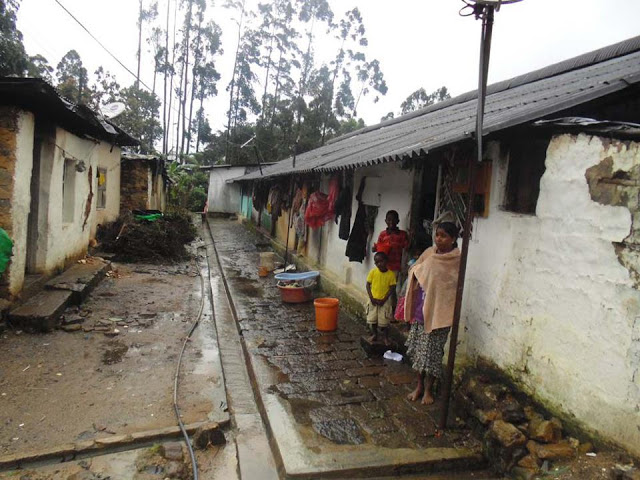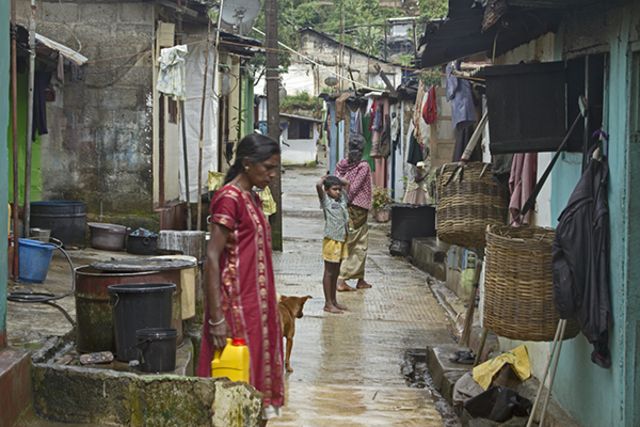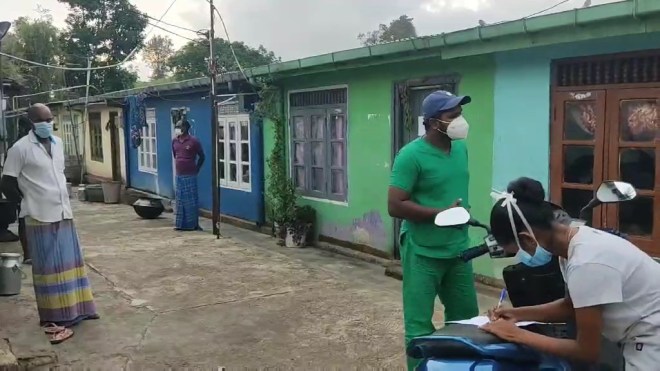Plight of Sri Lanka’s estate workers in corona time
Posted on June 26th, 2021
By Jeeva Sathasivam/www.journo.lk Courtesy NewsIn.Asia
Colombo, June 23: In early March 2020, when the coronavirus started to spread in Sri Lanka, a loose curfew was imposed island-wide for over three months. Thus a large number of infections were not identified. Further, the death toll was not that high. The total death toll from the first wave was a mere 11. The second wave, which began in October 2020, was also somewhat subdued in Sri Lanka.
Although it was not so severe in the early part of 2021, the number of infected people crossed 100,000 in the period after the Sinhala and Tamil New Year. Meanwhile, the death toll also had surpassed 1000. The number of deaths has increased by an average of 30 per day, and the number of infected people has crossed 2,500 a day. During the first wave there was an island-wide curfew. This time the country is being shut down partially with travel restrictions.
The main means of avoiding contraction are regular washing of hands, maintaining a distance of 1.5 meters from others, wearing a face-mask, practicing hygienic rules, and staying away from others, even at home.
Although it may be easy for those who have set up separate dwellings and are leading a comfortable living to follow such rules, this instruction is very hard to put into practice in upcountry plantation areas, especially in the case of those living in line-house dwellings.

Those identified as COVID positive were advised by the government to be quarantined in their homes which came into effect on May 17. An upcountry person fell sick which was confirmed as coronavirus. He was asked to be quarantined in his line-house. This resulted in two more, including a 9-month-old baby from the same family, catching the virus. They were hospitalized within a day or two after the infection was confirmed. Those who live nearby, live in great fear of catching the virus and worrying about their lives.
In another Line House, a person was confirmed as corona positive and was also advised to stay at home. The death of a 52-year-old mother of four from the same area has further frightened the people of the estate.
Line houses accommodate 5 to 7 people from a family. Some homes have more people living in them. Mothers, fathers, children, adults and young people of marriageable age, all live in a small house called a line-house. This 120 sq.ft. is used by the whole family to sleep, change clothes, and share their joys and sorrows.
It is stipulated internationally that an individual needs 46 square feet. However, it is unfortunate that many families living in the upcountry still have to live in an eight by eight-feet room.
How can those who live in the hill country, live in such conditions, change their basic daily habits according to corona rules? It is impossible to follow the rules of hygiene in this intimate housing environment.
Historical Background
People who were brought to Sri Lanka as workers from India about 150 years ago were settled in the hill regions of the island. They then gave life to these forest lands. The situation is the same today.
Along with them came cholera. Like the current corona pandemic, many of those affected by cholera died. The medical system that existed in the plantation areas then still continues with little improvement.
‘Free education’ for upcountry plantation people became available decades later after other communities got it. The estates were taken over by the government in 1972 and estate education also came under the State. Today all the estate schools have been converted into government schools. Similarly, all plantation hospitals should have been converted into government hospitals. It is unfortunate that even today the plantation hospitals are managed by the estate management. In what way is it fair?
The estate people have not been absorbed into the national health system. It is a pity that the manager of the estate is the one who decides whether a patient needs an ambulance or not. Since the Estate Medical Assistants (EMA) are being paid by estate management, the question remains as to how such an EMA would serve the people.

There is a medical unit called the Estate & Urban Healthcare Unit under the Ministry of Health. The plantation sector hospitals should be brought under that unit on a planned basis.
Upcountry representatives during the Good Governance” regime voiced in parliament that MBBS qualified doctors must be appointed to the plantation sector hospitals and provided with medicines through the state medical department.
It is now up to members of parliament representing the upcountry areas to identify locations to isolate people with corona. Civil society organizations have been demanding that arrangements be made in the factories that are closed, school buildings and reading rooms in collaboration with the estate administrations for the purpose.
There is a need for PCR equipment in the upcountry where millions of people live, They lack of ambulances, especially in the plantation areas. But it is disappointing to see the contribution of the people’s representatives in meeting these needs.
Relief
It is important to note that the government circular to grant corona-period relief did not include plantation workers. The government provided dry rations and Rs. 5,000 allowances to poor families. But the people of the upcountry plantations have not been included in the related funding activities.
This is due to the fact that the hill-country people are not fully absorbed into the public administration system. There are many obstacles to that. The Upcountry Authority was set up to address these issues to some extent. Though there is a law passed by Parliament, no attempt has been made to implement that law yet. According to the Act, the New Villages Development Authority for the plantation region is under the Ministry of Hill-country Affairs. All the vacancies in that Upcountry Authority have been filled. Who hold those positions and what are they doing? No details are available.

Solution
Many living in these line-houses today have reached a higher level, and despite the possibility that they could renovate these houses in which they had traditionally lived, they are still living in poor conditions within the century-old system due to lack of land rights.
To what extent have the estate trade unions, which have kept binding the people to themselves through the trade union political system, been concerned about the interests of the people?
During the tenure of President Chandrika Kumaratunga, the Ministry of Housing for the Upcountry area was established and a housing scheme for the upcountry people was discussed. If it had been implemented according to that plan, today the line-apartments in the hill-country would be no more and the lines would have developed into villages.
The single-house project evolved into a multi-story housing scheme. In some places, multi-story houses were erected. Since that was not entirely feasible in those areas, in 2015, an individual housing scheme was introduced. In spite of many criticisms, thousands of houses were erected during this period and handed over to the public.
In addition to that, the foundation stone for thousands of more houses was also laid. But what will happen to the foundation stones remains to be seen.
It is necessary to carry out programs that bring up the living standards of these people working for the development of the Sri Lankan economy at par with other communities. It must be understood that the line settlements, which have been a hallmark of the area for many years and are symbols of disgrace to the nation, are not decent habitats for the people.
It will be possible to protect them from the corona only when these line-rooms are replaced by individual houses. Only then will those in the plantation sector be able to live a decent life. Upcountry leadership must think and act to bring about a political solution to providing services to the upcountry plantation people, including healthcare.